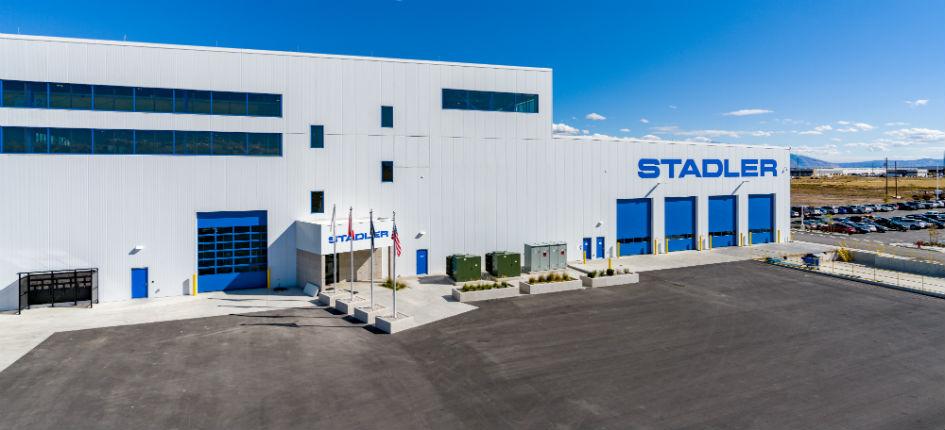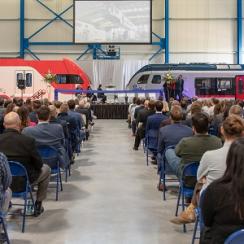The Thurgau-based manufacturer of rail vehicles has been supplying its products to North America for 20 years. In the beginning, they worked with select customers: “We initially cherry-picked customers in the USA, where our vehicles really fitted the profile, and supplied them from Switzerland,” says Martin Ritter. In 2015, the decision was taken to establish a local branch in Salt Lake City, to be able to serve the North American market locally and also to place more focus on the Canadian market.
Difficult climate requirements – Stadler scores points with its snow and mountain railway experience
The trains supplied for the Trillium Line in Ottawa have to be adapted to the Canadian climate. In what way? “The climate requirements are usually very high in North America – and of course especially with the harsh climate and the cold-wet snow that can be found in Ottawa. As a Swiss vehicle manufacturer with experience in mountain railways and snow-worthiness, we were able to score big with regard to reliability in the winter conditions found in Ottawa.”
Trains for Canada are produced in Switzerland
The trains that will one day run through Canada’s Ottawa are being manufactured at home in Bussang. Martin Ritter says: “It certainly has a lot to do with the Swissness factor. At our North American location, we are still relatively young and strongly oriented towards the Western US. But of course the cost factor is another reason to deliver the vehicles directly to Canada and not via Salt Lake City.”
2015: Localization in North America – with the support of the Swiss Business Hub USA
An initially chance contact with the Swiss Business Hub USA resulted in Stadler repeatedly having contact and minor engagements with the North American representatives of S-GE.
“I wanted to take a close look at the Canadian market with the support of the Swiss Business Hub Canada. The experience was very good; the local staff were very proactive and personally interested in public transport.”
In 2017, the Swiss Business Hub Canada organized a Fact Finding Mission, which enabled Martin Ritter to travel through the South and East of Canada and meet relevant business partners.
“The Fact Finding Mission certainly helped us to expand our relationship network accordingly; it had been relatively limited in Canada up to that point. The trip gave me the opportunity to meet not only potential customers, but also relevant people from the industry. The relationships that we have built up there continue and we still maintain them to this day,” says Martin Ritter. “And of course, as an innovative company, it’s very exciting to be able to inspire the people there with thought-provoking modern vehicle technology.”
The Canadian market attaches great importance to locality
According to the CEO’s personal assessment, the barriers to entry in Canada are somewhat lower than in the USA. He says that there is generally no local production share, although there is a demand for orders that are at least 20 percent locally produced. Ritter has also observed that politics play a greater role in Canada than in other markets “Therefore, as a company you have to think about a long-term strategy to be perceived as a reliable and good supplier in Canada – and also a little bit as a local supplier as well.”
“Thanks to the Free Trade Agreement, we are of course very well positioned as Swiss citizens. We have really good opportunities as a Swiss company, our values of punctuality, reliability and quality are appreciated,” is how Ritter sums it up.
Potential and challenges in Canada
Canada is currently investing heavily in public transport. Cities like Toronto, for example, are growing at an extreme rate, which puts a corresponding strain on the entire public transport system. In addition to close political networks and local rivalries, cultural challenges should not be underestimated. “The regions are not only linguistically but also culturally different.” Coming from Switzerland, one is used to this to a certain degree, says Martin Ritter with a smile.
Another important catchword: foreign currency risk. “This is certainly an issue presents a major challenge from a Swiss perspective. Especially in our business, where the contract terms are extremely long. This is due to the Swiss franc on the one hand, but also because of the Canadian dollar.”
Tips for doing business in Canada
“I think you have to take your time to understand the Canadian market and also the people,” says the CEO. Personal relationships play an important role – as do the cultural characteristics that Canada carries with it. It takes time to know and understand the cultural and political connections.
“You can't succeed in North America from a distance. You have to get closer to your customers and build personal relationships.”






